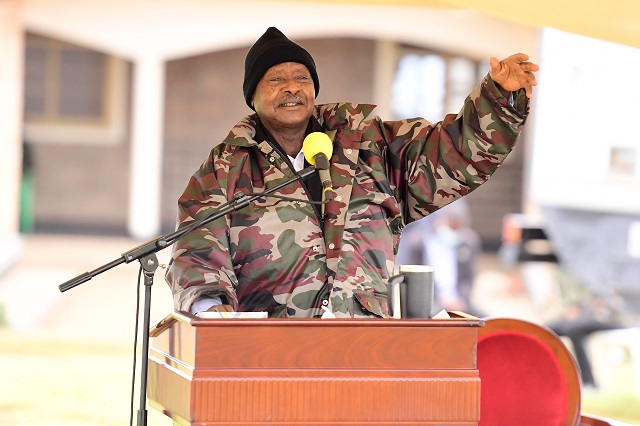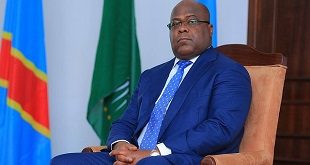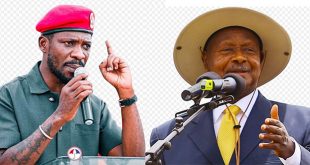
Why I believe that Museveni would make a strategic partner in negotiating political reform
THE LAST WORD | Andrew M. Mwenda | Last week, I argued that political development and democratic progress in Uganda have been held back by the attitude of the opposition towards President Yoweri Museveni. It is true Museveni has often employed brutal methods to retain his power by repressing opposition to his rule. But this has been a secondary strategy of last resort. For the most part, Museveni has used persuasion and cooptation (patronage/bribery) to consolidate his power. But as his popularity and therefore credibility and legitimacy have waned, his reliance on patronage has grown in tandem with a tendency to resort to repression to hold the smoldering edifice of his system together.
Although this points to a grim future for democracy in the country, it can also be an opportunity for political reform towards more open society. Museveni’s retreat to repression through abductions and torture of opposition activists is not a demonstration of strength but of vulnerability. This means that political repression can actually become a seedbed for democracy. Because he is more vulnerable, Museveni is much more willing to negotiate than when he was at the pinnacle of his popularity and legitimacy. For we must remember that throughout his political career, Museveni has always been open to negotiations with his opponents, including armed and violent ones, even though on his own terms.
Democracy cannot be birthed by the barrel of the gun. It can only grow through negotiations and compromise. Yet the opposition in Uganda is hostile to this very idea. The opposition in Uganda is not monolithic. However, the opposition I am talking about here are two radical groups – Defiance led by Dr. Kizza Besigye and NUP led by Bobi Wine. These are the powerful forces of the opposition with great passion and enthusiasm. They are equally the most intolerant. Because of their power, they have stifled the more liberal minded and tolerant factions of the opposition; especially those inclined to negotiations and compromise.
Within Defiance and NUP, negotiations are seen as a sign of weakness and evidence of bribery; compromise is capitulation. They also see Museveni as a devil, equal in evil to Adolf Hitler and therefore an enemy to destroy not an opponent to defeat. This attitude frees them from all moral restraint in terms of actions they can take to get rid of him. Of course, this compliment is returned by Museveni’s apparatchik, the more reason security services abduct and torture their activists. As I argued last week, the opposition have thus become strategic captives of their subjective feelings. This is a dangerous for our country, for it undermines reform.
We need to move from both extremes to the center. The possibilities are many even though their chances look bleak. The first step is to avoid introducing foreigners into our struggles the way Bobi Wine recently went to ICC. This is because foreign powers come with their own national interests. It is worse when they have no national interest at stake. For then they are self-righteous and self-righteousness is a much more stubborn trait to deal with than self-interest. Besides, even when they are well intentioned, outside powers come armed with ideological beliefs, prejudices, assumptions, etc. They therefore seek to promote solutions based on text book theories that may not fit our particular context.
The political development and democratisation of Uganda will depend more on us talking to each other than fighting each other. This does not mean that fighting is always bad. As long as the fights are civil and based on principle and seeking to achieve national objectives, they are okay. But every fight on the street must aim at forcing negotiations on a round table. A government born out of negotiation and compromise will be more inclined to govern by similar means. Equally, government born by obliterating its opponents will be more inclined to govern by similar means. The solution for Uganda is to reject those who seek total defeat of their opponents.
I believe that Museveni is a good candidate for political progress based on negotiations and compromise. Throughout his career, Museveni has fought many opponents, armed and civic, and in different parts of the country and at different times. In the case of armed/violent rebellion, he has sought to secure a military victory first. After defeating his opponents on the battlefield, he has offered them political negotiations. The outcome has always been to integrate their fighters into the NRA/UPDF and their political leaders into his cabinet and diplomatic service. He has won over or coopted many of his civic opponents by not keeping grudges.
Therefore, the potential for negotiations leading to a government of national unity exists with Museveni as president. The problem is that the most passionate opposition activists see this as surrender. They want to win everything they want and demand; so, they have made the perfect the enemy of the good. But this strategy is self-defeating. The opposition have been unable to dislodge Museveni militarily or through elections or civil disobedience. This has given the president time and space to employ his salami strategy – to keep slicing the opposition bit by bit. Every year, his credibility, popularity and legitimacy decline. And each year, he slices more layers upon layers of the opposition’s leadership.
The irony is that as Museveni has grown weaker and weaker, and those hostile to his rule have grown larger and larger, the president has gained greater control of the political machinery. He has skillfully exploited the radicalism of Defiance and NUP to win over moderate leaders of the opposition. In the process, he has cut the head (leadership) from the body (followership). The large mass of Ugandans who could rally against him do not find a sufficient number of leaders with experience, skills and political profile to convert their frustrations into an effective political force. This has left Museveni in an uneasy but still good position: he is presiding over the piling up of social dynamite but is also holding the buttons to the detonator.
It does not make strategic sense for the opposition to lock themselves out of a potential power-sharing arrangement. Over the years, I have grown wary of the politics of winner-take-all. We need a constitution where power is shared based on each political party’s performance in elections as Rwanda does. This would incentivise our politicians to moderate their language during campaigns knowing that your opponent in elections is likely to be your partner in government the better to be civil towards them.
*****

amwenda@independent.co.ug
 The Independent Uganda: You get the Truth we Pay the Price
The Independent Uganda: You get the Truth we Pay the Price



This Tibuhaburwa who picked guns and headed for the tall grass in Luweero to embark on slaughtering innocent Ugandans after being defeated in 1980 general elections never be sold to anyone as potential candidate for negotiations and compromise!!
For your cult Tibuhaburwa’s mission is you either agree with him and join his bootlickers sycophant s or he finds a way of getting rid of you forever. Exampls abound: How did he deal with late Dr Andrew Kayiira, recent Rwenzururu palace, the Mukura massacres, inter-alia? Just like you Mr Anderea Mujuni M9 yourself, who thinks that only your political ideas/ opinions are superior! I dare you Mr Anderea, try to experiment the superiority of your political ideas/ opinions in the laboratory of 2026 general elections by offering your candidature as the leading opposition presidential candidate!!
The 1648 treaty of Westphalia helped the West establish concept of the modern nation state that got refined over the centuries. By the time Europeans got in contact with us their cultures were at a higher Stage of evolution than ours on economic, political, & military fronts hence were able to subdue us & establish imperial control over us to form empires with us as constitute colonies. Fast forward to sixties and African countries begin getting independence, various groups of peoples whose solidarities were more to tribal or religious commitments, with neither the education or experience in running & planning for state bureaucracies, got thrust together to forge working nations. We have come a long way but we have to identify bits that are still missing.
The players in the political process (gov’t incumbents & the opposition) should reach a consensus on direction we want to take country so that moot points became which is best route to take to reach that future, rather than extinguishing each other before we get to the future, in Uganda it is as if we don’t have an agreement as a people where we want to be in 20, 40 or 60 years.
Democratic rule involves a concept of conceding rule to those who garner 50+1% of the total vote; but what comes next after this in liberal democracies is the other 49% of voters or minorities in a society aren’t seen as an entity to be crushed or subjugated but rather mutual tolerance is practiced to achieve better harmony & progress. In our semiauthoritarian regime elections are held to bring a sense of legitimacy to Museveni’s regime but if he would rather have it another way he would rather just violently crash his opponents than tolerate their existence in the same political space, this can be partly attributed to his foundational marxist beliefs in which he felt Ugandans a peasant class whose only struggle should be a proletariat revolution to improve our lot in life rather than concentrating on identity that has plagued Uganda since independence. But ultimately most marxist leaders end up dictators because they view opposition to their approach as an act of insurrection or sedition against the state which they run or intend to.
Many political systems exist, absolute monarchs like Saudi Arabia exist where people follow leaders because of respect of the divine right that being born in the royal family gives one to rule over them no matter the quality of the leader, if we decided to take up liberal democracy lets start by getting basics right like building institutions that don’t rotate around cult personalities like Museveni, Besigye or Bobi Wine. Or we can decide like the Chinese did that for over 4000 years of their history political power has been wielded by chopping rather than counting heads.
As of 2023, for a country of about 45 million people, almost all of those eligible to vote (with exception of an insignificant number) are functionally illiterate, politically naive & of economically precarious means, this isn’t a good recipe to have from a pool of potential voters. For many of their formative decades the political systems of nations like the USA or UK didn’t have universal suffrage, restricting voting to landed gentry & other societal elites. In our current system even those who have nothing at stake go and cast a vote, not caring what their choices have for the future of the nation, we end up with a legislature whose quality reflects voter competencies.
1.Provided a nation is still poor;Democracy and the rule of law may not flow smoothly;You think its by accident that the Arabs states,Latin American states,carreberian states and African states have issues of democracy and the rule of law?
2.UK has had civilized coups because they are wealthy in a span of 3 years England had 4 Prime Ministers;i,e May,Johnson,Liz Strauss and the Indian man.Just imagine that happening in Africa?
3.In the third world; the role of the army is so crucial in the stability of the nation.
4.Uganda is currently in the right path in the field of governance and democracy and freedom of speech.
5.The Opposition politicians in are Uganda are still childish ;Can you imagine Besigye succumbing to the hostages in his party ?There is this notion that most Ugandans are corrupt which is wrong.There are those who still have integrity therefore the pressure that Besigye is under going to justify why he kept money in his home in that he even had to stage manage the photocopies of the bank notes he received from Nathan is a clear sign that the opposition leaders are hostages in their party they can not breath.What has caused this;they are preoccupied with keeping up appearance and secondly;the need to sustain the momentum at which they attack M7 so that donors dont withdraw funds .
6.Every nation has their own style of politics;Kenya has stabilized with tribal sentiments for Uganda; we are still learning but by the look of things;The people of the North,East and West Nile are more comfortable with M7 than NUP that is Buganda owned.
Seriously Mwenda, you do not fail to amuse. You and your friend M7 have really changed from the people who had admirable convictions to opportunistic ; greedy and self-seeking ones. Which road did you travel since 2009 that has moved you from a journalist of conviction to one who spreads conspiracy theories. There is a die-hard NRM Brigadier who passed one but you hated each other because you were on opposite ends of political spectrums. If that Brigadier came back from the dead, he will be surprised at the change in you. BUT you did travel a Damascus Road and that Road was one of embracing and cheer-leading corruption.
Your article , is very predictable. You have been attacking the opposition for a long time as an NRM propagandist.
But this article confirms your NON BELIEF IN DEMOCRACY and Rule of law.
Democracy is PRIMARILY about a people’s voice and respect for the Constitution [ if it the right constitution is in place . A constitution that has captured the views of the people] NOT your kerfuffle you are proposing – negotiation between parties. Which parties are you thinking about Mwenda will be in the negotiations? Museveni and his family negotiating with who? bearing in mind that M7 does not keep his side of the bargain. And where will the People of Uganda be in these negotiations? what about the Constitution , or what is left of it as M7 has mutilated it with complete impunity? What about your project of installing Muhoozi as president after his dad?
Mwenda / Uganda, you do not fail to depress.